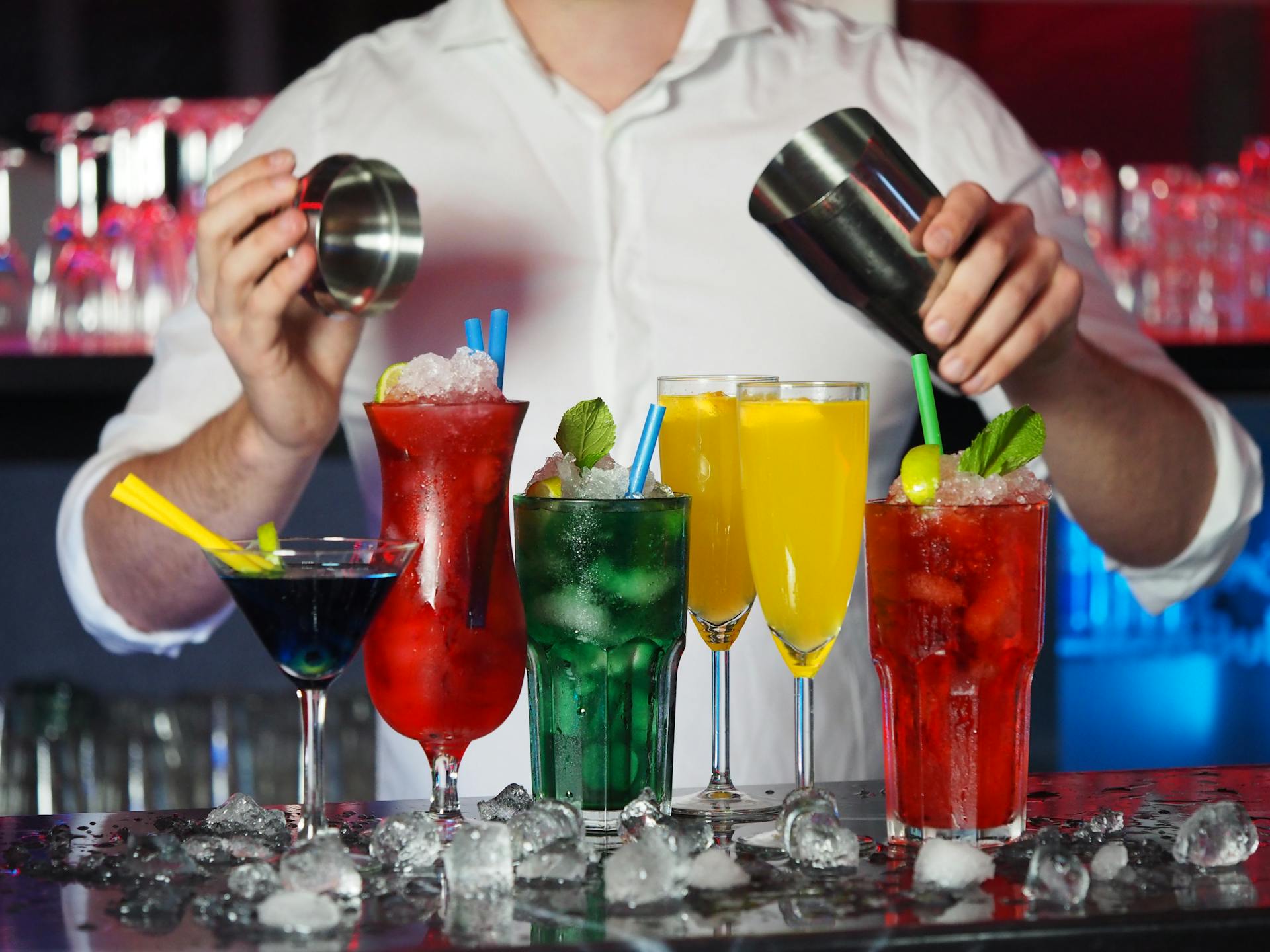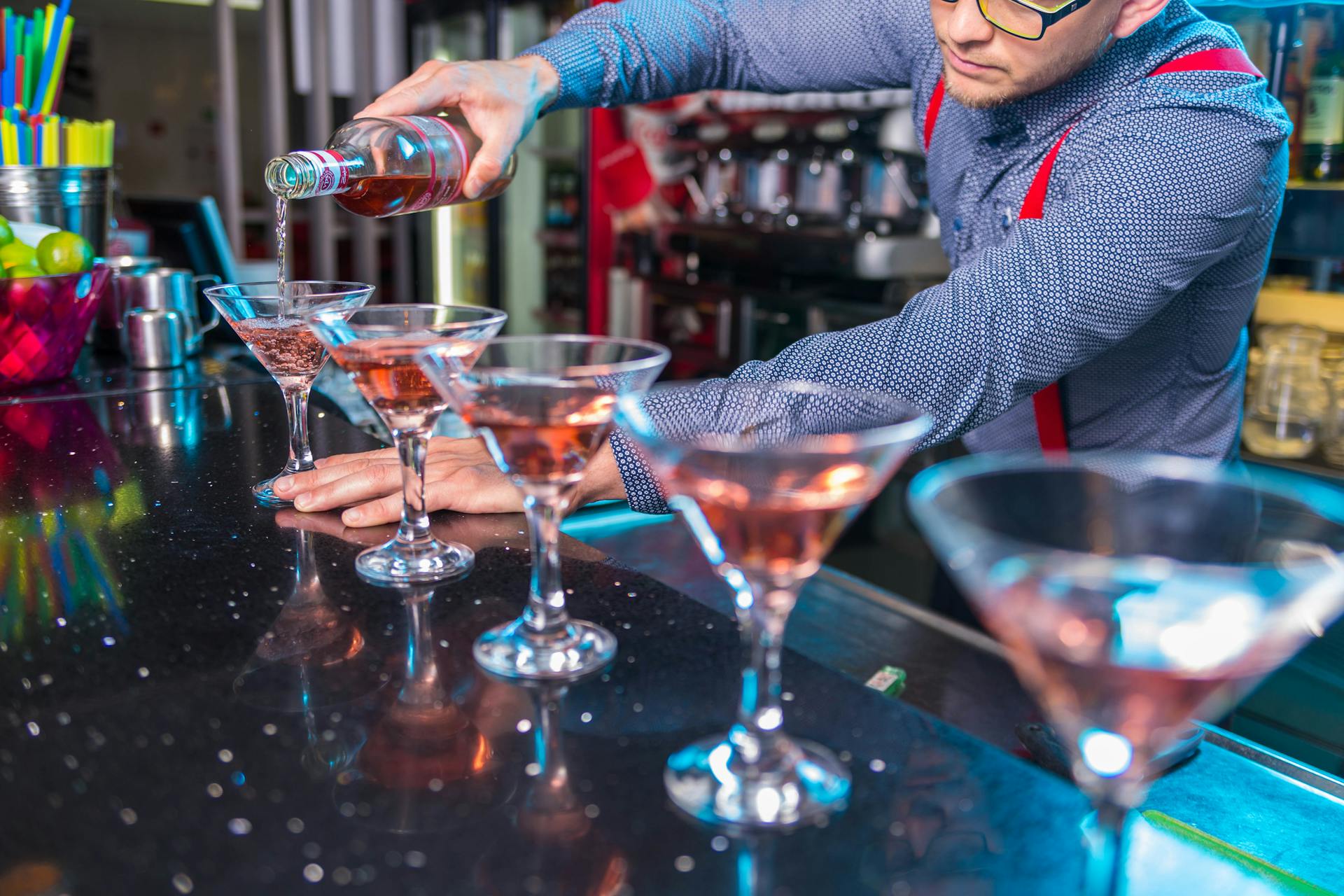
Liquor liability insurance is a type of insurance that protects your business from financial losses resulting from serving alcohol to patrons who then become intoxicated and cause harm to themselves or others.
This insurance coverage can help pay for damages, medical expenses, and even legal fees if your business is sued.
The policy can also cover the costs of defending your business against claims of overserving alcohol, negligent service, or failure to prevent underage drinking.
In the event of a lawsuit, liquor liability insurance can help pay for the costs of hiring an attorney and covering any settlements or judgments.
For your interest: Can My Business Pay for My Car Insurance
What Liquor Liability Insurance Covers
Liquor liability insurance covers a wide range of incidents, including bodily injury, property damage, and legal fees. This type of insurance is essential for businesses that serve alcohol, as it protects them from potential financial losses.
Assault and battery claims are a common type of liquor liability claim, which can arise from situations where a customer you served alcohol to physically harms another person while under the influence. Dram shop statues in many states hold establishments that overserve liquor liable to anyone injured by the drunken patron or guest.
Check this out: What Type of Business Insurance Do I Need
Liquor liability insurance can help cover the costs of property damage caused by intoxicated patrons, including damages to another person's belongings. This type of insurance is designed to protect businesses from legal and financial repercussions that may arise from serving alcohol.
Some common scenarios that liquor liability insurance covers include:
- Bodily Injury: Coverage for injuries sustained by patrons due to alcohol consumption at your establishment.
- Property Damage: Protection against damages caused by intoxicated patrons.
- Legal Fees: Coverage for legal expenses incurred in defending against claims.
In the event of a claim, liquor liability insurance can help cover litigation costs, including the fees to retain an attorney and court costs. This type of insurance is essential for businesses that manufacture, sell, or serve alcohol, as it provides coverage for claims related to property damage or injuries resulting from the intoxication of a customer.
Do I Need Liquor Liability Insurance?
If your business is involved in making, selling, distributing, or serving alcohol to customers, obtaining liquor liability insurance is highly advisable. Some types of businesses that may require liquor liability coverage include restaurants, caterers, liquor stores, and grocery stores that sell alcohol.
Check this out: Business Insurance for Grocery Stores
If you operate in a state with dram shop laws, which hold businesses liable for damages caused by intoxicated individuals, liquor liability insurance is even more essential. As of now, forty-three states have dram shop laws in place.
To determine if you need liquor liability insurance, consider the types of businesses listed above and check if your state has dram shop laws. Here are some examples of businesses that may require liquor liability coverage:
- Restaurants
- Caterers
- Liquor stores
- Grocery stores
Do I Need?
If your business serves alcohol, you're likely aware of the risks involved. You need liquor liability insurance if your business manufactures, sells, serves, or facilitates the use or purchase of alcohol.
Some businesses are more likely to require liquor liability insurance than others. These include restaurants, caterers, liquor stores, and grocery stores that sell alcohol alongside other products.
Forty-three states have dram shop laws in place, which hold businesses liable for damages caused by intoxicated individuals to whom they served alcohol. This means that if your business operates in one of these states, liquor liability insurance is even more essential.
Curious to learn more? Check out: Slave Insurance in the United States
If your business is involved in serving alcohol, especially in a state with dram shop laws, it's crucial to have liquor liability insurance in place. This protects you against loss or damages claimed as the result of a patron becoming intoxicated and injuring themselves or others.
Here are some examples of businesses that typically require liquor liability insurance:
- Restaurants
- Caterers
- Liquor stores
- Grocery stores
Why Is It Important?
Liquor liability insurance is a must-have for businesses that serve alcohol. It provides legal protection in case a guest causes harm to themselves or others after consuming alcohol at your venue or event.
The costs associated with alcohol-related incidents can be staggering, with potential expenses including legal fees, settlements, and medical expenses. Without proper coverage, your business could face significant financial strain from lawsuits and claims.
Having liquor liability insurance gives you peace of mind, allowing you to focus on providing a positive experience for your guests rather than worrying about potential liabilities. It's a safety net that helps you stay secure and confident in your business operations.
Additional reading: Legal Code or Artical on Overhead and Profit Insurance Claim
Purchasing and Understanding Insurance
You can purchase liquor liability insurance in multiple ways, including through various coverage options that can be tough to understand.
There are two primary coverage options you'll likely see when requesting a quote.
To mitigate risks, liquor liability insurance provides comprehensive coverage that helps sellers of alcohol protect their customers and the public.
As a seller of alcohol, you have a responsibility to protect your customers and the public, and liquor liability insurance helps with that.
Readers also liked: Liquor Liability Insurance for Event
Purchasing Options
When purchasing liquor liability insurance, you have multiple options to consider. You can purchase it directly from an insurance provider or through a broker.
There are two primary coverage options to choose from. These options are often the most common and relevant to your needs.
You can purchase liquor liability insurance that's tailored to your specific business type. This includes restaurants, bars, and liquor stores.
A restaurant that serves alcohol will need liquor liability insurance that covers incidents related to the serving of alcohol on their premises. This type of insurance is essential for protecting their business from potential liabilities.

You can also purchase liquor liability insurance as a host, which provides protection from liabilities arising from events where alcohol is served. This is a great option for businesses or individuals hosting events.
Dram shop insurance is a specific type of liquor liability coverage that's essential for establishments that sell alcohol. It covers civil liabilities and claims related to the sale of alcohol.
Here are some common liquor liability insurance options to consider:
- Liquor Liability Insurance for Restaurants: Covers incidents related to the serving of alcohol on premises.
- Liquor Liability Insurance for Hosts: Provides protection from liabilities arising from events where alcohol is served.
- Dram Shop Insurance: Covers civil liabilities and claims related to the sale of alcohol.
Comprehensive Business Coverage
Comprehensive business coverage is essential for any establishment that serves alcohol. This includes restaurants, bars, and liquor stores that need tailored liquor liability insurance policies to meet their specific needs.
Liquor liability insurance can be categorized into different types, including liquor liability insurance for restaurants, hosts, and dram shop insurance. Dram shop insurance is particularly important for establishments that sell alcohol, covering civil liabilities and claims related to the sale of alcohol.
Monoline liquor liability insurance can be beneficial for businesses that own a lot of commercial property. This type of insurance can help protect property insurance rates by separating out potential liquor liability claims. For example, a $300,000 liquor liability claim would not affect property insurance rates.
For your interest: Motorcycle Shop Insurance
Liquor liability insurance can help cover claims related to assault and battery, drunk driving incidents, and property damage. This includes situations where a customer served alcohol causes harm to another person or damages property.
A comprehensive liquor liability insurance policy can provide coverage for a wide range of incidents, including bodily injury, property damage, and legal fees. This can help mitigate the risks associated with serving alcohol and protect businesses from unforeseen liabilities.
Here are some examples of what liquor liability insurance can cover:
By understanding the costs and coverage options available, business owners can make informed decisions that protect their financial interests and ensure safe environments for their guests.
Frequently Asked Questions
What is the difference between general liability and liquor liability insurance?
General liability insurance protects against third-party claims, while liquor liability insurance specifically covers incidents related to the sale and service of alcoholic beverages
Is liquor liability insurance expensive?
Liquor liability insurance costs start at $425/year for annual coverage and $275/event for three-day coverage, with average annual payments ranging from $690 to $321 for event policies. The cost may vary depending on your specific needs and circumstances.
Sources
- https://www.leavitt.com/select-ins/ins/liquor-liability-insurance
- https://www.landesblosch.com/blog/liquor-liability-insurance-everything-you-should-know
- https://www.geretyinsurance.com/liquor-liability-insurance/
- https://www.mccartyinsurance.com/liquor-liability-insurance-costs-and-coverage/
- https://www.grimesins.com/business-insurance/liquor-liability-insurance/
Featured Images: pexels.com


